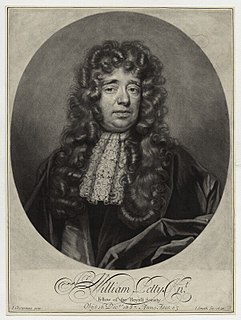A Quote by Edward Gibbon
To maintain the harmony of authority and obedience, to chastise the proud, to protect the weak, to reward the deserving, to banish vice and idleness from his dominions, to secure the traveller and merchant, to restrain the depredations of the soldier, to cherish the labors of the husbandman, to encourage industry and learning, and, by an equal and moderate assessment, to increase the revenue, without increasing the taxes, are indeed the duties of a prince . . .
Related Quotes
He was a foe without hate; a friend without treachery; a soldier without cruelty; a victor without oppression, and a victim without murmuring. He was a public officer without vices; a private citizen without wrong; a neighbor without reproach; a Christian without hypocrisy, and a man without guile. He was a Caesar, without his ambition; Frederick, without his tyranny; Napoleon, without his selfishness, and Washington, without his reward.
Nature without learning is like a blind man; learning without Nature, like a maimed one; practice without both, incomplete. As in agriculture a good soil is first sought for, then a skilful husbandman, and then good seed; in the same way nature corresponds to the soil, the teacher to the husbandman, precepts and instruction to the seed.
Idleness is the grand Pacific Ocean of life, and in that stagnant abyss the most salutary things produce no good, the most noxious no evil. Vice, indeed, abstractedly considered, may be, and often is engendered in idleness; but the moment it becomes efficiently vice, it must quit its cradle and cease to be idle.
By multiplying the means of gratification, by promoting the introduction and circulation of the precious metals, those darling objects of human avarice and enterprise, it serves to vivify and invigorate the channels of industry, and to make them flow with greater activity and copiousness. The assiduous merchant, the laborious husbandman, the active mechanic, and the industrious manufacturer,-all orders of men, look forward with eager expectation and growing alacrity to this pleasing reward of their toils.
One man should not be afraid of improving his posessions, lest they be taken away from him, or another deterred by high taxes from starting a new business. Rather, the Prince should be ready to reward men who want to do these things and those who endeavour in any way to increase the prosperity of their city or their state.
Let it not, therefore, be said that the Sovereign is not subject to the laws of his State; since the contrary is a true proposition of the right of nations, which flattery has sometimes attacked but good princes have always defended as the tutelary divinity of their dominions. How much more legitimate is it to say with the wise Plato, that the perfect felicity of a kingdom consists in the obedience of subjects to their prince, and of the prince to the laws, and in the laws being just and constantly directed to the public good!
Civilization, let me tell you what it is. First the soldier, then the merchant, then the priest, then the lawyer. The merchant hires the soldier and priest to conquer the country for him. First the soldier, he is a murderer; then the priest, he is a liar; then the merchant, he is a thief; and they all bring in the lawyer to make their laws and defend their deeds, and there you have your civilization!
God has ordained the state as a delegated authority; it is not autonomous. The state is to be an agent of justice, to restrain evil by punishing the wrongdoer, and to protect the good in society. When it does the reverse, it has no proper authority. It is then a usurped authority and as such it becomes lawless and is tyranny.
Industry need not wish, and he that lives upon hopes will die fasting. There are no gains without pains. He that hath a trade hath an estate, and he that hath a calling hath an office of profit and honor; but then the trade must be worked at and the calling followed, or neither the estate nor the office will enable us to pay our taxes. If we are industrious, we shall never starve; for at the workingman's house hunger looks in, but dares not enter. Nor will the bailiff or the constable enter, for industry pays debts, while idleness and neglect increase them.







































